This is a story about a girl who loved a boy. The girl’s name was Michal. The boy’s name – we all know him – was David.
David began as a shepherd boy, then a musician in Saul’s home there to soothe the King with his harp playing. Maybe the girl noticed him even then, we can’t be sure. But more recently, David has become famous for killing the terrible warrior and scourge of Israel, Goliath. From that moment of mythic fame, where he kills giant Goliath with only a sling and a stone, our hero leads Israel’s army in victory after victory. He is admired by King Saul, and becomes lifelong friend to the King’s son, Jonathan.
Michal is used to privilege as the younger daughter of King Saul. She has four siblings, three brothers and one older sister. Though the biblical telling of her story doesn’t mention her appearance, Jewish tradition says that she was uncommonly beautiful. But she is no more immune to David’s charm than the rest of the nation, and soon she will fall in love with this Shepherd boy turned national hero. Who wouldn’t?
But even as Michal takes note of David, King Saul becomes jealous of David. Why? Because of a stupid little song he overhears some laughing women singing: “Saul has killed his thousands, and David his ten thousands.” Underlying that growing jealousy is the knowledge that all of Israel is following David’s career with great delight. The Scriptures even say that “all of Judah and Israel loved David.”
But there’s an even deeper thread to this story. Saul knows that David is blessed by God even as Saul himself has been warned that he is under God’s curse for disobeying God. Saul is the first to realize that David’s rise is a part of that prophecy, and from here on it will be a power struggle between David and Saul, David’s house and Saul’s house. This struggle is not ultimately decided for years, and in the process, nearly everyone in Saul’s family, as well as Saul himself, will reap destruction.
The great tragedy is that Saul never sees one glaring truth: David loves Saul, respects Saul, and though much later on is given repeated opportunities to kill Saul, refuses to do so. Saul’s own jealousy blinds him to the humility that is David’s most winsome characteristic.
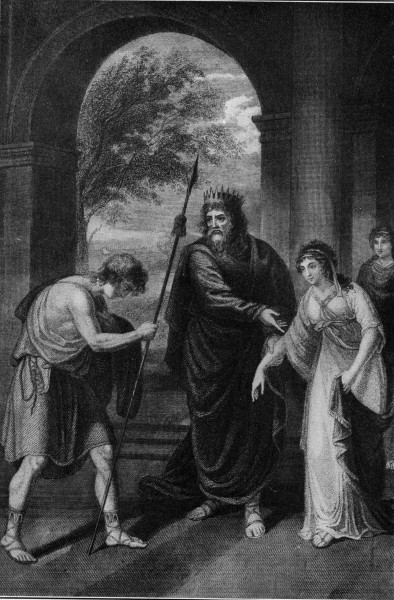 So as the King ponders those words the women sang, “Saul has killed his thousands, David his ten thousands,” Saul begins to wish for David’s death. And at this early stage, Saul decides to let others do the dirty work for him. He figures the Philistines, Israel’s enemies, will soon kill off this young upstart. So he does the politically expedient thing, and offers David his older daughter, Merab, an offer David with his characteristic humility seems to accept but only under pressure. After all, when still menaced by Goliath, Saul had promised great rewards to anyone who would kill the giant warrior. Those rewards apparently included, along with wealth and no taxes for his entire family, a daughter of King Saul in marriage. When it actually comes time, though, for Saul to give Merab to David, he hands her off to another man.
So as the King ponders those words the women sang, “Saul has killed his thousands, David his ten thousands,” Saul begins to wish for David’s death. And at this early stage, Saul decides to let others do the dirty work for him. He figures the Philistines, Israel’s enemies, will soon kill off this young upstart. So he does the politically expedient thing, and offers David his older daughter, Merab, an offer David with his characteristic humility seems to accept but only under pressure. After all, when still menaced by Goliath, Saul had promised great rewards to anyone who would kill the giant warrior. Those rewards apparently included, along with wealth and no taxes for his entire family, a daughter of King Saul in marriage. When it actually comes time, though, for Saul to give Merab to David, he hands her off to another man.
When Saul hears that his younger daughter Michal loves David, he sees an opportunity to set David up for almost certain failure and death. Scripture records the birth of this in Saul’s mind: “Let me give her to him that she may be a snare for him and that the hand of the Philistines may be against him.” How will Saul accomplish this? Saul sends messengers to David, telling him that Saul wants David to become his son in law. David protests that he is a poor man, and has no dowry to give Saul for Michal. The messengers return to Saul, and get further instructions from him: “Thus shall you say to David, ‘The king desires no marriage present except a hundred foreskins of the Philistines, that he may be avenged on the king’s enemies.’”
Perhaps Saul hoped the mutilation of Philistine warriors – certainly circumcision of their dead warriors would have been viewed by them as an insult to their collective manhood – might cause them to rise up in rage and crush David.
David, never one to be bothered much by unequal odds, immediately accepts Saul’s bizarre request for a wedding dowry. He has no idea Saul dislikes him, much less wants him dead. And off he goes to kill a hundred men and gather the bloody gift required to wed Saul’s daughter.
When David presents the 100 foreskins to Saul, Saul is shaken to the core. He also increases in his enmity toward David. First Samuel says: “But when Saul realized that the LORD was with David, and that Saul’s daughter Michal loved him, Saul was still more afraid of David. So Saul was David’s enemy from that time forward.” Saul realizes God is on David’s side, but instead of placing himself in the hands of God, he trusts in his own wily cleverness.
But Michal’s love for David has some sort of additional dark meaning for Saul. What is it? Saul’s fear is that he is losing his kingdom and his power. Michal is part of that power, not just a girl but a political asset. We know all through history that princesses were often given by their King fathers to those the Kings feared, or wanted to make an alliance with. But Michal actually loved David. And by loving him, she was unconsciously doing what Saul should have done. Yet I suspect – the text is silent here – that Saul is most troubled by Michal’s love for David because it means she is no asset to him. Perhaps he could have hoped that she’d be a secret ally within David’s house. But instead her heart has gone to David, and Saul by losing her is losing more power. From this point on, Scripture says, Saul’s heart sees David as his enemy.
Saul sets in motion things that damage and destroy relationships all around him. And he does it all because he refuses to submit to God, to trust and love God no matter what happens, to receive whatever God brings even if it is losing the kingdom. Saul is us, of course. How often our hearts choose the proud road, choose to say “no!” to God, choose to manipulate others around us even if it means we will hurt them in life-altering, terrible ways. Saul’s way is a giant sized warning sign: destroy your family, destroy your hopes and dreams and desires, destroy love itself… choose against God, and you can destroy it all… destroy them.
Saul turns to his son Jonathan as he begins to plot against David in earnest. But Jonathan is a singularly bad choice; David and Jonathan, Scripture says, felt their souls had been knit together as one. They had made a covenant with each other. Theirs was a friendship between two great hearts nearly equal in humility and in wisdom. And so Jonathan warns David—the first of a few such warnings from Jonathan that save David’s life—and David successfully avoids Saul for a time.
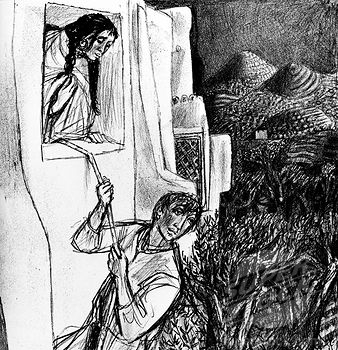 Saul next involves Michal in a plot to put David’s home under surveillance at night, then murder him in the morning. It seems Saul forgot what he’d known clearly so recently. Michal loves David. And she warns David, then helps her new husband in an elaborate escape. First, she helps David escape by lowering him from a window – perhaps their bedroom was in an upper portion of the house they occupied. Second, Michal takes a household idol, likely a human-sized so-called Terraphim, and dresses it up. She places it in the bed where David was supposed to be, and adds a finishing touch with some goat’s hair for the head. She then tells Saul’s messengers that David is sick. Maybe smelling a rat, Saul sends them back to get David bed and all so Saul can personally kill David.
Saul next involves Michal in a plot to put David’s home under surveillance at night, then murder him in the morning. It seems Saul forgot what he’d known clearly so recently. Michal loves David. And she warns David, then helps her new husband in an elaborate escape. First, she helps David escape by lowering him from a window – perhaps their bedroom was in an upper portion of the house they occupied. Second, Michal takes a household idol, likely a human-sized so-called Terraphim, and dresses it up. She places it in the bed where David was supposed to be, and adds a finishing touch with some goat’s hair for the head. She then tells Saul’s messengers that David is sick. Maybe smelling a rat, Saul sends them back to get David bed and all so Saul can personally kill David.
When Saul finds out Michal lied, and that David is gone, he’s beside himself. “Why have you let my enemy go like this?” Note how Saul forgets the plain reality of marriage, that a man leaves his mother and father, and clings to his wife, and they become one flesh. Saul’s political mind sees in terms of power, not in terms of love. He can’t fathom a girl loving her young man. All he can see is the threat to his earthly kingdom. Michal, of course, comes up with a pretty good fib, that David threatened to kill her if she made a fuss about his escape. One wonders if Saul believed her.
About that idol. How did an idol of some other god end up in a story involving the Jews, who were after all people supposedly who had only one God? Unfortunately, idols never quite go away in Israel all through the Old Testament. These Terraphim, as they were called, were rumored to be good for fertility – that is, getting pregnant – and some of you may remember that Jacob’s wife Rachel swiped a Terraphim from her father as she and her husband fled him back in Genesis. The fact such idols were supposedly good for fertility does make one wonder if Michal is the one who had such a thing in their house. If so, it wasn’t unusual, unfortunately. This idol problem, putting trust in things other than the One True God, is one that we never quite get away from. Of course, none of us today have idols…
David has to flee Jerusalem after Jonathan comes and warns him that Saul is out to kill him once and for all. David ends up with a rag-tag army running around out in the mountains. Saul comes to chase David around at times, but inevitably ends up going back to Jerusalem unsuccessful. Meanwhile, David ends up with two more wives. Michal is absent from him, not knowing from day to day if he’s alive or dead.
Saul now does something that once and for all lets us know what he thinks of Michal, how he sees his youngest daughter. Though she is married to David, Saul gives her away to another man named Paltiel, also called Palti. This goes directly against Judaic law – David was still alive, and therefore remained her husband. Saul’s personal corruption is underscored by his disdain both for Michal and for God in giving her to another man.
This is where, quite a while ago, I first took real notice of Michal, of her pain, of her increasingly tragic life in this larger story of David and Saul. Michal, that young princess and lover of the shepherd boy hero, is now a pawn on a chessboard. Did Saul imagine he was weakening David by doing this, or that David would come rushing to attempt a rescue of his wife? The text is silent. I can’t help but wonder if Saul knew all along Michal had lied about David’s escape, and also knew that Michal had helped David rather than Saul. In short, I wonder if first and foremost Saul giving Michal to another man was an act of revenge against her for daring to choose David over her father.
Time again passes. Saul’s kingdom continues to weaken. Finally, Saul himself, along with Jonathan and another of Saul’s sons, dies in battle with the Philistines. David mourns Saul’s death, and the death of Jonathan, his dear friend. And still more time passes, around seven years if I figure right from the different passages on this, as the last son of Saul, named Ish-Bosheth, attempts to hold onto the kingdom. Finally Ish-Bosheth tries to appease David. But David says, “”Give me my wife Michal, to whom I became engaged at the price of one hundred foreskins of the Philistines.”
Consider Michal. Here is a woman who’s father used her as a political bargaining chip, then tried to involve her in assassinating her own husband. When that didn’t work, she was given away to another man. But in a strange twist that lends realism to this story, the man named Paltiel, whom Saul had given Michal to as wife, is heartbroken; obviously he truly loved Michal. He walks, weeping, along side Michal as she is taken back to David. Finally, warned to go home, he turns back. But what of Michal? Did she love him? Did she still love David? How confusing, how broken and twisted up, were her feelings? And how did she perceive herself?
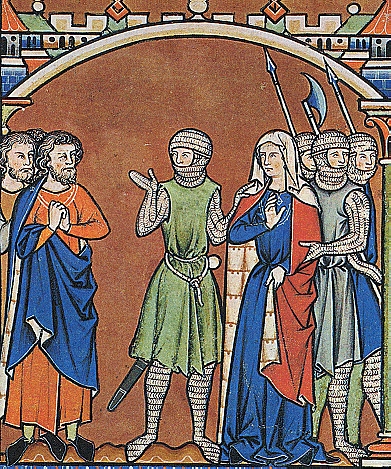 We cannot know. The text is silent. It is so tempting to inject our own feelings, our own way of seeing in this 21st century, into a story that happened thousands of years ago and to a people who lived in a far different world. I’m tempted to become all therapeutic about this, to have Michal feeling things that a woman from our century would feel. Certainly this culture was male-dominant, with women often little more than property to be passed around. Michal was certainly treated that way. But what we’re looking for is what God wants us to hear, and not a message that however true it might be, isn’t really the central core of the story. I say that as more of a feminist than many Christians I know, by the way.
We cannot know. The text is silent. It is so tempting to inject our own feelings, our own way of seeing in this 21st century, into a story that happened thousands of years ago and to a people who lived in a far different world. I’m tempted to become all therapeutic about this, to have Michal feeling things that a woman from our century would feel. Certainly this culture was male-dominant, with women often little more than property to be passed around. Michal was certainly treated that way. But what we’re looking for is what God wants us to hear, and not a message that however true it might be, isn’t really the central core of the story. I say that as more of a feminist than many Christians I know, by the way.
I must confess that as I read this story, I also wonder about David’s motives. Was getting Michal back once again about power, the need to consolidate his own claim to the throne by restoring Saul’s daughter to himself? Was there any real feeling left in him for Michal? Even if there was, could it be shared with all those other women? I’m left suspecting that David primarily wants to strengthen his claim to the throne by having Michal publically at his side.
Again, the text is silent.
We don’t hear about Michal again until one last incident, the one incident most of us remember her for. And it isn’t her best day.
David has been on a roller-coaster of emotions. From fugitive to King and now after a victorious battle against an enemy of Israel, he goes before the Ark of the Covenant walking and leaping and praising God, dressed only in a linen garment called an ephod. He isn’t naked by our standards, but it might have been a bit like the President of the United States dancing and leaping and yelling hallelujiah while dressed only in a pair of long-johns. So as they came into town, Michal saw him dancing, and as the Scripture records it, “she despised him in her heart.”
Oh, in her heart! In that secret place where only we and God dwell, where the real hopes and dreams, good and evil intentions, are birthed. And sometimes where love dwells unrequited until it dies, or is transformed into hatred and contempt.
Can love coexist with contempt? Can we love someone and hold no respect whatever for them? Humanly, I would say that happens more often than we like to admit. It is wrong. It is also reality. So I don’t know if Michal loved David any more or not, after all she’d been through. Maybe she loved him, but as a warrior and King and hero rather than as the same man who once sang psalms to God while alone with the sheep in the fields. Maybe she loved him for the wrong reasons? Perhaps there was even agonizing self-doubt in her heart regarding the terrible way the rest of her family had ended up, and her own part in that end by saving David’s life. I don’t know. The text again is silent here. She might have had none of these thoughts.
What happens next one sees coming. As David comes up to the doors, Michal comes out to meet him. It isn’t certain how public this meeting was, but it did take place outdoors, and possibly before a large number of people. David had come, the text says, to bless his household. But Michal speaks first. “How the king of Israel honored himself today, uncovering himself today before the eyes of his servants’ maids, as any vulgar fellow might shamelessly uncover himself!”
David, who is riding the crest of waves of joy and exaltation, probably feels this verbal assault from Michal like a blow to the gut. And he responds this way: “It was before the LORD, who chose me in place of your father and all his household, to appoint me as prince over Israel, the people of the LORD, that I have danced before the LORD. I will make myself yet more contemptible than this, and I will be abased in my own eyes; but by the maids of whom you have spoken, by them I shall be held in honor.”
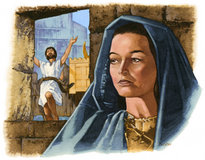 When I first read this story, I did not realize this conversation had taken place in public. Because it most likely did, I understand more fully why David responded as he did. But that first sentence is so harsh, so much pointing to the fact that Michal’s family was removed from power and that David’s throne was established in Saul’s place by God. Yes, it was absolutely the truth. But was it the truth told in love? Was David, at that moment, being loving to Michal? The boy and the girl are now a man and a woman, haunted by the specter of her father’s mistreatement of them both.
When I first read this story, I did not realize this conversation had taken place in public. Because it most likely did, I understand more fully why David responded as he did. But that first sentence is so harsh, so much pointing to the fact that Michal’s family was removed from power and that David’s throne was established in Saul’s place by God. Yes, it was absolutely the truth. But was it the truth told in love? Was David, at that moment, being loving to Michal? The boy and the girl are now a man and a woman, haunted by the specter of her father’s mistreatement of them both.
I think what David said had to be said because of the public nature of Michal’s attack on him; whether she understood it or not, she was attacking his Kingship, and she was doing so not merely as his wife but also as one of the very few surviving members of Saul’s lineage. There is a strange mix of humility, truth, and unyielding single-mindedness in David’s response that hurts but could have also healed. How? If Michal could have let go of her pride, the wrongful pride that unfortunately reminds us a little of her father’s pride that destroyed him, she might have understood what David seemed to. As he writes in Psalm 18:1: “I love you, O LORD, my strength.”
This humility about oneself, a humility rooted in the reality that all trappings of power and prestige are mere additions to a mortal who will soon be dust, is David’s saving grace. Michal is not portrayed as having understanding of that side of David, the part of David that causes Scripture to record that he was a man after God’s own heart.
Michal’s response to David’s rebuke is not recorded. What is recorded is that she had no children until the day of her death. We don’t, however, know why. Did David never again sleep with her as husband with wife? Or did David continue to love her, but her womb was barren? The text doesn’t say.
It is important when we read many stories in the Old Testament to note that they are often descriptive, not prescriptive. That is, they record something that happened, they describe names, dates, and places. Many times they do not clearly draw morals or conclusions or offer teachings from what happened. They don’t always spell things out for us. The stories themselves ARE the teaching. We have to prayerfully read them and try to understand how the story of another human being in another time and place applies to our own story in this time, this place.
Michal’s part in the larger story of David and Saul is a small part, almost a bit role. But that role is very important for us to ponder. She is a victim, yes. A poster-child for insuring women are empowered in our own society, and more importantly empowered in our own churches. Otherwise, how can a woman love God when she’s not equipped to love herself?
Michal was a princess but she was nothing at the same moment, just a tool to be used by her father. Michal was a queen but she was nothing at the same moment, just a political link to legitimize her husband’s throne.
We’re to love one another as we love ourselves. I’m no therapist, and I’m not trying to offend anyone, but that really does imply we have to love ourselves. But we have to love ourselves truly, that is, for the right reasons. Michal was loved by God because God is love, and because she was made in the image of God. No one is forgotten by God. As Mahalia Jackson sings, “His eye is on the sparrow” and on you and me.
Why do we suffer? I don’t know. I don’t pretend to know. But I do know this. Jesus suffered. Jesus, who by being both God and man bridged this gap for me, for you, also answers the question “Why?” the best it can be answered. That is, He is the only answer we are going to get.
Virtually everyone here today knows to one degree or another what it is like to become a victim. Maybe only on a very small scale; someone being cruel to us in school or at work, an incident that doesn’t change our lives for the worse but does hurt and is remembered. Or, maybe on a very large scale. Some have been molested as children. Others were abused physically. Others were victims of neglect by parents strung out on drugs or alcohol. Others were victims of rape.
I have no easy platitudes to wipe away such pain. But I wonder if Michal’s story is a warning to us. We cannot control what evil is done to us through the hands of other human beings. People of color in our nation have been enslaved and or murdered at the hands of my own race. Michal suffered terrible things, but I think some of you here in this room have probably suffered even worse things. Yet some of those very same people have chosen to love God rather than fear him as someone harsh and cruel.
Who loved Michal? Maybe David did. Paltiel, that poor man who was briefly her husband, did. Her father did not. But I believe God did. And where I look for the evidence to back that claim is to the cross of Christ. Christ was a man of sorrows, aquainted with grief. He was loved by few while on earth, and murdered by so called righteous men both Jew and Gentile. Yet he remained love. He told us to love one another, as He loves us.
You see, the text is silent about Michal’s later life. It is silent about her, yet speaks about us, about our pain and pride and inability to forgive one another, our terrible failures to love one another. That is what the story is about. That, and it is about God’s love. God’s grace, that runs down over our misery and shame and sense of living lives without meaning, God’s hope that calls us upward toward him on the hard path of obedience, the path where as Tina said last week, joy and suffering walk together.
Like Michal, we may look back through our lives and discover key moments where anger and hurt turned to bitterness, even despair. We, too, can easily find people in our lives to blame. Our parents, our friends, and as Michal did, our spouses. We can even blame God, beginning to question whether or not He is a loving God or a harsh taskmaster. And we can choose to dwell in that bitter place, where we find ourselves trapped. Or we can face the pain of our lives, face the destruction others have brought to us, face injuries large and small, and slowly step by step learn to dwell with God as David did.
Like Michal, we cannot choose always what comes to us because of circumstances or because of other human beings controlled by evil desires who did terrible things to us in our past. But our freedom to choose is NOW. We can choose love of God. We can choose loving our neighbor. We can choose to live in pursuit of holiness and purity, even if someone once treated us as though we were impure garbage.
Or we can choose to do a most curious, tragic thing. We can choose to revenge ourselves on someone else by being bitter, angry, and unforgiving. But this is no different than someone using a razor blade to mutilate themselves. The comfort is short-lived, the blood we draw is our own, and the scars always increasing.
It may even turn out that our bitterness has hidden hard truths from us. I’m not speaking to victims of rape, or incest, or violence here. But maybe in some other cases those we blame aren’t the evil monsters we thought they were. Maybe they, too, were simply human and carried their own wounds. And in a few cases, maybe it will even turn out that we, not they, were the victimizers.
Grace is a scarey place. We don’t get to wear white hats and black hats, be good guys and bad guys, hold on to our hurts and bitterness like they are treasure instead of poison. Let it all go, and fall into your Father’s arms. Dare to be innocent again, to be a child and admit that all you really want is what God has.
The above is a sermon Jon Trott offered as a “pinch hitter” pastoral stand-in at Jesus People USA Covenant Church, and may have been edited in a few spots.

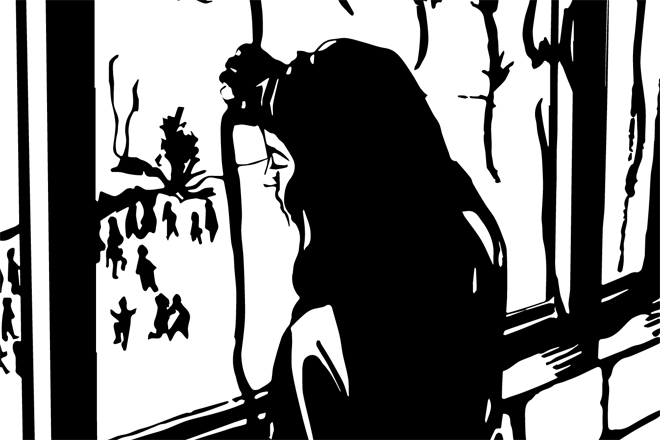
Thank you so much for posting this sermon, I have learned so much. I always wondered about David’s first wife, and the way that this narrative was a written was truly I believe inspired and I was very blessed by this message.